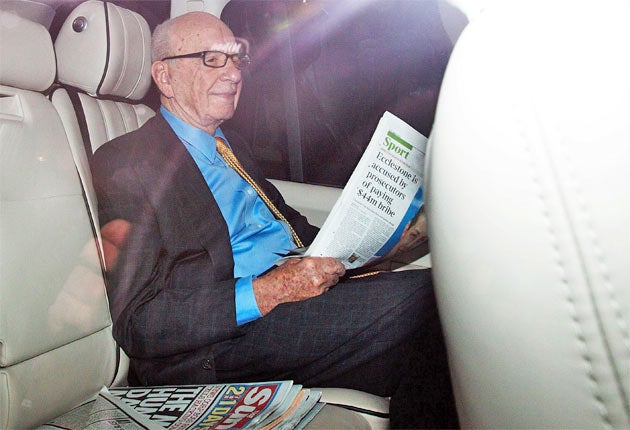How the answers given to MPs have simply raised more questions
Testimonies from the Murdochs and Brooks on Tuesday still leave key gaps in the story

Your support helps us to tell the story
From reproductive rights to climate change to Big Tech, The Independent is on the ground when the story is developing. Whether it's investigating the financials of Elon Musk's pro-Trump PAC or producing our latest documentary, 'The A Word', which shines a light on the American women fighting for reproductive rights, we know how important it is to parse out the facts from the messaging.
At such a critical moment in US history, we need reporters on the ground. Your donation allows us to keep sending journalists to speak to both sides of the story.
The Independent is trusted by Americans across the entire political spectrum. And unlike many other quality news outlets, we choose not to lock Americans out of our reporting and analysis with paywalls. We believe quality journalism should be available to everyone, paid for by those who can afford it.
Your support makes all the difference.1. The 2007 internal report
Paul Farrelly MP "James Murdoch, can you tell us about the file of emails, the so-called internal report that was discovered, allegedly — we read in the pages of The Sunday Times — in the offices of Harbottle & Lewis. Can you tell us a bit more about when that was discovered, when you first came to know about it and what is in it?"
James Murdoch "I first came to know about that earlier this year, in 2011."
Farrelly "Can you be more precise?"
James Murdoch "It would have been in the spring time. I do not remember the exact date when I was told about it."
Farrelly "Before April?"
James Murdoch "April or May."
Why the exchange matters The report allegedly contained emails showing evidence of criminality, including payments to police. Mr Murdoch's answer means NI may have withheld this evidence from Operation Weeting for up to three months.
2. The 2010 DCMS report
Philip Davies MP "When our report was published, when you [Rebekah Brooks] were chief executive of News International... we found the evidence from News International was wholly unsatisfactory. We referred to the collective amnesia in our report, and felt it was inconceivable Clive Goodman was a rogue reporter. When you were chief executive of News International, at the time the report was published, did you read it?"
Rebekah Brooks "Yes, I did. I'm not saying I read every word, but I read a large majority of it. I particularly read the criticisms addressed to the company, and I can only hope that, from the evidence you have heard from us today, you know that we have really stepped up our investigation. Rupert and James Murdoch have been here today, being very open and very honest with you... I hope you think that when we saw the civil disclosure in December 2010 we acted swiftly and promptly to deal with it... I am not saying we have not made mistakes, but the Metropolitan Police have repeatedly said, as you heard last week – or the Home Affairs Committee heard – that there was no need for a further criminal investigation. So I think everyone involved in 2007 would say now that mistakes were made. But I hope you feel we have responded appropriately and responsibly since we saw the information in 2010."
Why the exchange matters News International executives only reviewed the internal report lodged with the lawyers Harbottle & Lewis in "Easter" 2011. Then they waited up to three months before passing the information to police (see No 1, above).
3. Neville Thurlbeck
Tom Watson MP "In 2008, why did you not dismiss News of the World chief reporter Neville Thurlbeck, following the Mosley case?"
Rupert Murdoch "I'd never heard of him."
Why the exchange matters This is an extraordinary claim. Mr Thurlbeck was the chief reporter of the News of the World, Mr Murdoch's best-selling paper, and had delivered a succession of front-page stories. Max Mosley's court victory in 2008 – in which the judge suggested Mr Thurlbeck was an unreliable witness – was prominently reported.
4. Payments to police
Tom Watson "Can I take you back to 2003? Are you aware that in March of that year, Rebekah Brooks gave evidence to this Committee admitting paying police?"
Rupert Murdoch "I am now aware of that. I was not aware at the time. I am also aware that she amended that considerably, very quickly afterwards."
Watson "I think that she amended it seven or eight years afterwards."
Rupert Murdoch "Oh, I'm sorry."
Watson "Did you or anyone else at your organisation investigate this at the time?"
Rupert Murdoch "No."
Watson "Can you explain why?"
Rupert Murdoch "I didn't know of it, I'm sorry. This is not an excuse. Maybe it is an explanation of my laxity. The News of the World is less than 1 per cent of our company. I employ 53,000 people around the world who are proud and great and ethical and distinguished people. Perhaps I am spread watching and appointing people whom I trust to run those divisions."
Why the exchange matters News International appears to have been unconcerned the editor of its second-bestselling newspaper, The Sun, had apparently admitted bribing police. (In 2011, Ms Brooks clarified the remarks made in 2003, saying she had been speaking about the industry in general and knew of no such payments.)
Join our commenting forum
Join thought-provoking conversations, follow other Independent readers and see their replies
Comments